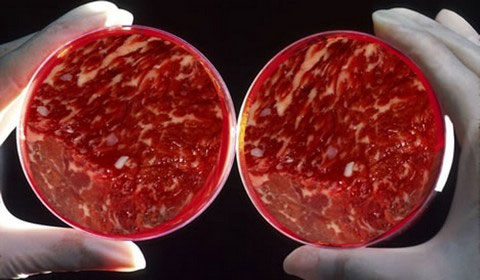'Feeding' meat in the laboratory
Instead of raising animals for meat, some scientists are experimenting with "raising" meat in the laboratory.
Someday, humanity will use the 'bred' meat in the factory? The future is unknown, but now, Dr. Vladimir Mironov (University of South Carolina Medical School) is raising 'meat' in the laboratory. This research has been under way for a decade.
Dr. Mironov, director of the tissue culture center of the Department of Cell Biology and Renewable Medicine at the University of Medicine, South Carolina - is one of the few scientists in the world who is studying the technique of 'cultivating' meat - a product that he believes could solve the global food crisis because of lack of livestock land.
 The first product of cultured meat just looked like minced meat, researchers are trying to create the meat with full muscle tissue. PETA awarded $ 1 million to the first scientist to produce and commercialize cultured meat. (Photo: Peta)
The first product of cultured meat just looked like minced meat, researchers are trying to create the meat with full muscle tissue. PETA awarded $ 1 million to the first scientist to produce and commercialize cultured meat. (Photo: Peta)
Meat culture is also being promoted in the Netherlands but in the US, there is still no need or funding for this field, Dr. Mironov said. The US National Institute of Food and Agriculture refused to fund; The National Institutes of Health also said no and the Aeronautics and Space Administration is very modest, Mironov said.
'In order to bring a new technology to market costing an average of 1 billion USD, we even need less than 1 million USD,' Mironov said. 'How would you like that meat to taste? The taste of pork or lamb? We will create exactly what you want by designing their structures , 'Mironov said.
Dr. Mironov took from myoblast turkeys (embryonic cells that grow into muscle tissue) and 'fed' them in a nutrient mixture called bovine serum to develop animal skeletal muscle tissue.
His team is also trying to add fat, vascular systems to cultured meat cells so they can get oxygen and grow into a complete piece of meat, instead of a piece of thin muscle tissue.
'Cultured' meat may be cheaper than meat from a farm. If the public accepts 'cultured' meat, it will be a lucrative commodity. Nicholas Genovese, of the Humanitarian Treatment Organization (PETA), which is funding money to run the meat culture laboratory, said Dr. Mironov.
According to the argument of N. Genovese, animals need 1.4 - 3.6 kg of nutrients to produce 450 grams of meat. That is not to include 30% of the earth's surface for meat and meat processing. This is very inefficient, they consume food and create waste.'Moreover, if humans conduct other planetary exploration, we need to' cultivate 'meat and not bring a cow out into space.'
However, Genovese admitted: 'People will be horrified if they know that their meat is grown in a laboratory. They don't like to combine technology with food ', but he added that ' We have to see these ideas as a development. Otherwise we will stall. 15 years ago, did anyone imagine an iPhone phone? '
- Dishes from the lab
- In 2030, turkeys will be raised in the laboratory
- There is an opportunity to 'enjoy' artificial meat
- Cultivate cattle meat
- 'Chicken' from the lab will be sold in 2018
- Vegetable meat
- Create chicken in the laboratory
- Artificial beef will be available in the market: Breakthroughs for vegetarians because they do not want to kill
- By 2040, too many meat products are not of animal origin
- PERES - Meat sniffing equipment
- In Russia, there will soon be selling artificial meat
- What do you know about 'vegetarian' meat?
 Why do potatoes have eyes?
Why do potatoes have eyes? 'Tragedy' the world's largest carnivorous life: Death becomes ... public toilet
'Tragedy' the world's largest carnivorous life: Death becomes ... public toilet Tomatoes were once considered 'poisonous' for 200 years
Tomatoes were once considered 'poisonous' for 200 years Detecting microscopic parasites on human face
Detecting microscopic parasites on human face